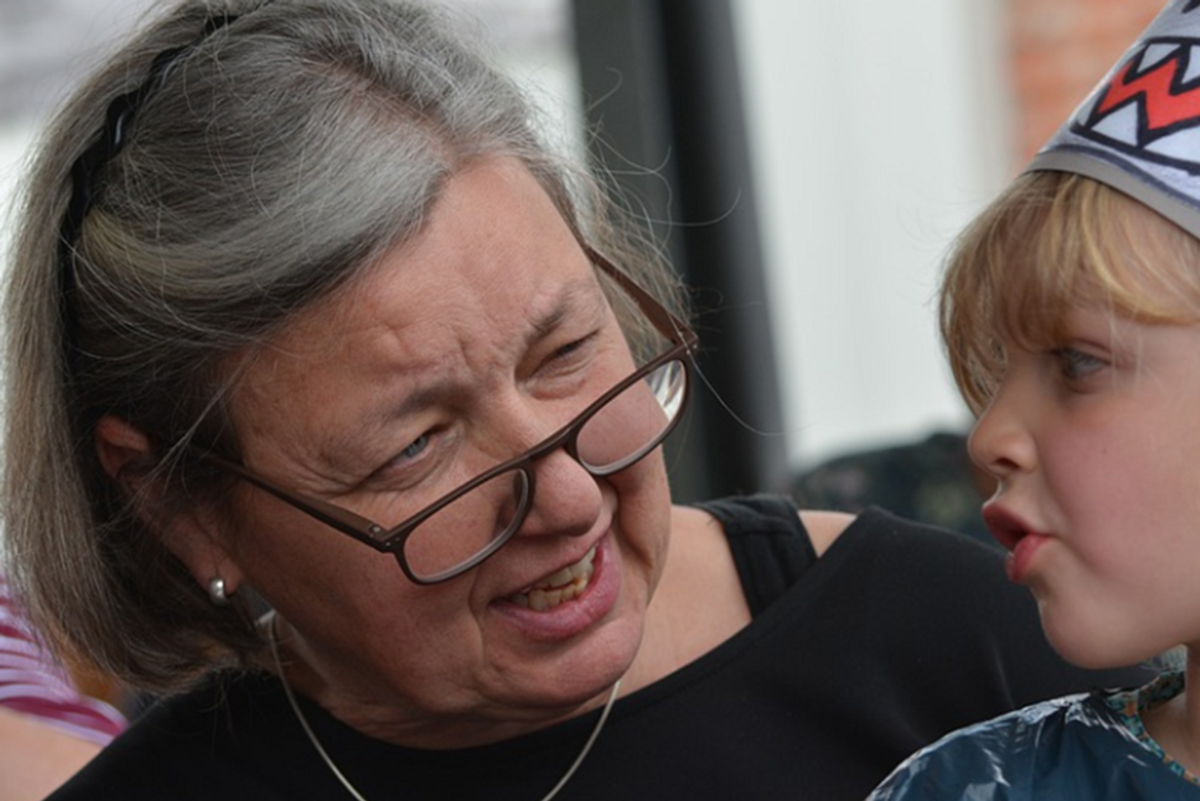Study shows that grandmas may feel closer to their grandkids than their own children
There's an important reason for it.

A grandmother and grandchild.
For the past 55 years, scientists have theorized that a major reason why humans live so much longer past their reproductive years than other species is because of grandmothers. The "grandmother effect," as it's known, postulates that in hunter-gatherer societies, grandmothers played a vital role in finding food and raising children. In fact, the grandmother's role was so important that it had a huge impact on whether or not children survived.
"By relieving a mother of some of her child-raising responsibilities, so the thinking goes, grandmothers make it easier for their daughters to have more children and also make it possible for those children to have longer lives by helping them during the difficult early years of life," Haider J. Warraich writes in Stat. Two studies further this hypothesis by showing the important roles that grandmothers have in the survival of their grandchildren. A study of birth and death records in Finland for individuals born between 1731 and 1890 found that having a maternal grandmother between the ages of 50 and 75 increased a child's survival rate.
Another study found that proximity to grandmother matters, too. The shorter the distance between grandmother and grandchild, the more involved the grandmother can be and the more benefits that accrue to her daughter and grandchildren.
The grandmother effect could be a major reason why a new study shows that grandmothers may feel a closer emotional bond to their grandchildren than their own offspring.
A study by James Rilling of Emory Universityin Atlanta, Georgia published in "The Royal Society" measured brain function in 50 grandmothers with at least one biological grandchild between 3 and 12 years old.
Grandmothers were shown photos of their grandchild, an unknown child, an unknown adult and the same-sex parent of the grandchild. The study found that when a grandmother saw a photo of their grandchild it activated parts of their brain associated with emotional empathy and movement.
When the grandmothers saw a photo of their adult child, it activated areas of the brain associated with cognitive empathy. So, to put it simply, when shown the pictures, the grandmothers were attempting to emotionally empathize with their grandchildren while trying to cognitively understand what their adult children were thinking.
"That suggests that grandmothers are geared toward feeling what their grandchildren are feeling when they interact with them," Rilling said in an Emory news article. "If their grandchild is smiling, they're feeling the child's joy. And if their grandchild is crying, they're feeling the child's pain and distress."
Given the importance of the grandmother effect, it's no surprise that our grandmothers seem to be hardwired to love us in the deepest way possible. Science shows that without this incredible bond, humans may not have made it this far. Conversely, it also shows that without having such an important role in their post-reproductive years, our grandparents may not have evolved to live so long.
In the end, the relationship appears to be symbiotic. Grandmothers promote the survival of a child who one day may grow up to be a grandparent and live longer because they have such an important role in the life of their grandchild.
This article originally appeared four years ago.
- Grandma and man she accidentally texted celebrate sixth ... ›
- She wanted to be called 'Grandma killer' in exchange for breaking ... ›
- Sassy TikTok grandma shares how she 'savagely' handled her ... ›
- She got all four of her grandparents to draw a flower. Then surprised them with a tattoo. - Upworthy ›
- Woman asks dad if he loves his kids or his grandkids more - Upworthy ›





 Buddy Holly was 20 years old in this photo.
Buddy Holly was 20 years old in this photo.  30 going on 60…
30 going on 60… Road Trip Summer GIF by @SummerBreak
Road Trip Summer GIF by @SummerBreak Long road trips are common for American families.
Long road trips are common for American families. Happy Pumped Up GIF by Universal Pictures Home Entertainment
Happy Pumped Up GIF by Universal Pictures Home Entertainment Dexters Laboratory What A Fine Day For Science GIF
Dexters Laboratory What A Fine Day For Science GIF The bread doesn't lie. Facebook/Jaralee Metcalf
The bread doesn't lie. Facebook/Jaralee Metcalf Uncle trading cards. screenshot from FNN
Uncle trading cards. screenshot from FNN More Uncle Trading Cards.screenshot from FNN
More Uncle Trading Cards.screenshot from FNN Uncle Trading Cards with stats, attack power, and more. screenshot from FNN
Uncle Trading Cards with stats, attack power, and more. screenshot from FNN Gotta catch 'em all. screenshot from FNN
Gotta catch 'em all. screenshot from FNN A young woman is stressed about her future.via
A young woman is stressed about her future.via